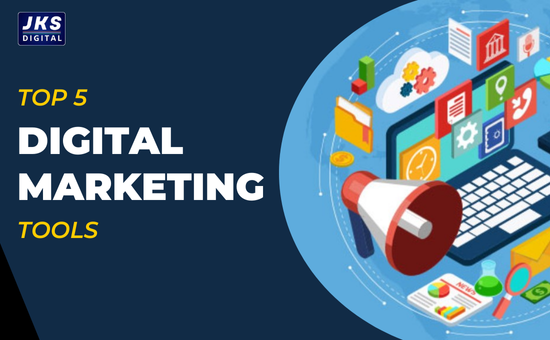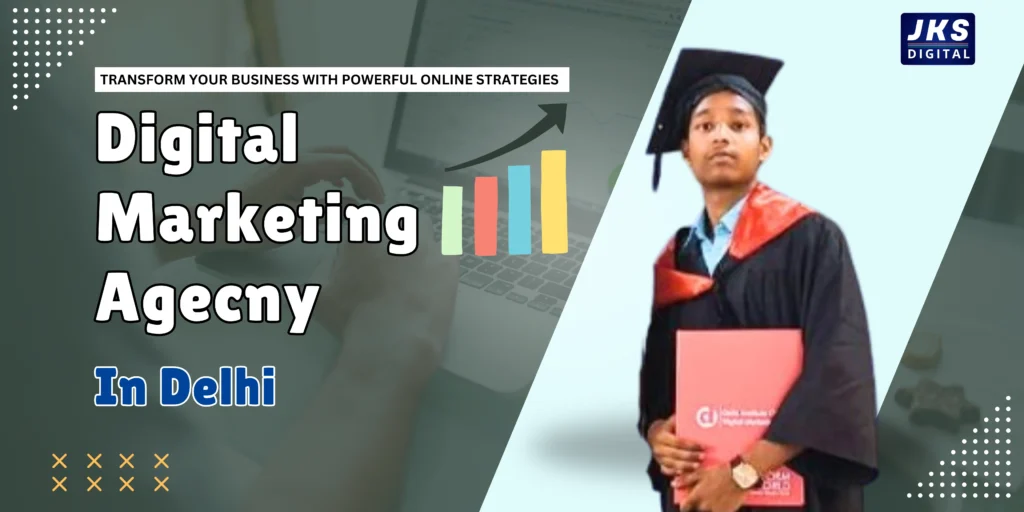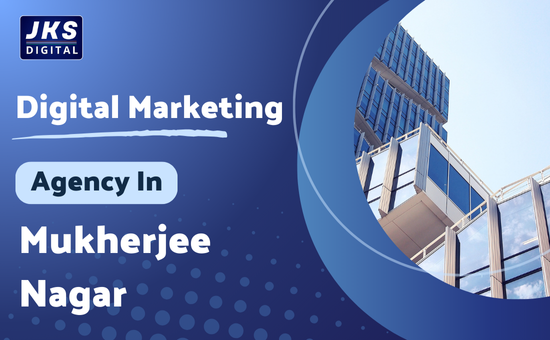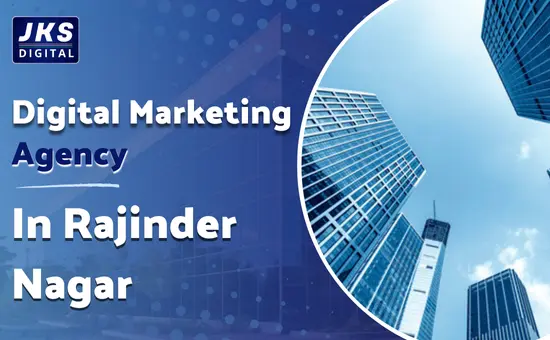Content Marketing Strategy: In today’s digital-first world, content marketing is an essential part of any business’s growth strategy. By crafting valuable and relevant content, businesses can attract, engage, and convert their target audiences. As a trusted Digital Marketing Agency in Delhi, JKS Digital has helped countless businesses develop content marketing strategies that drive measurable results. Whether you’re new to content marketing or looking to revamp your existing approach, this guide will help you create a strategy that resonates with your audience and aligns with your business objectives.
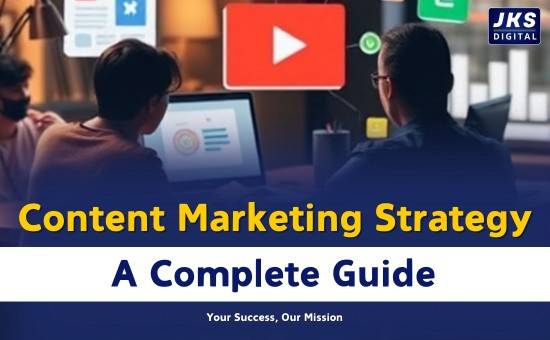
Explanation Content Marketing, and Why is it Important?
Content marketing is the process of creating, publishing, and distributing content to a targeted audience with the purpose of attracting, engaging, and retaining customers. Unlike traditional advertising, which directly promotes products or services, content marketing provides value by offering solutions, insights, or entertainment to audiences. This approach builds trust, establishes authority, and encourages brand loyalty over time.
In a bustling market like Delhi, content marketing is crucial for businesses to stand out and build lasting relationships with customers. It positions brands as thought leaders and generates consistent interest in a highly competitive environment. At JKS Digital, we believe that a well-executed content strategy can be the difference between a brand that simply exists and one that thrives.
Key Steps to Developing an Effective Content Marketing Strategy
Let’s walk through the core steps in developing a successful content marketing strategy that can make a positive impact on your business.
1. Define Your Goals and Objectives
Start by identifying the primary objectives of your content marketing strategy. Are you looking to:
- Increase brand awareness?
- Drive website traffic?
- Generate leads?
- Engage with current customers?
- Boost sales or conversions?
Clear goals will guide your content efforts and give you benchmarks to measure success. For example, if JKS Digital’s goal is to help a client increase brand awareness, our strategy might focus on producing educational blogs, informative videos, and social media content that showcases industry expertise.
Read more – What is SSL Certificate and Why is it Important to Install it on Every Website?
2. Identify and Understand Your Audience
Your audience’s needs and preferences should be at the heart of your content marketing strategy. Create buyer personas to represent your ideal customers. Consider:
- Demographics: Age, gender, education location and income level.
- Psychographics: Interests, values, and pain points.
- Behavior: Online habits, purchasing behavior, and preferred content formats.
In Delhi, for example, audiences may be more receptive to local culture and issues, so content that resonates with these factors may perform better. At JKS Digital, we use data and analytics to understand target audiences deeply, helping our clients deliver relevant and engaging content.
3. Conduct a Content Audit
If you’ve been producing content, review it to assess what’s been working and what hasn’t. A content audit allows you to identify gaps in your strategy, such as outdated content, ineffective topics, or underperforming formats. Analyze metrics such as:
- Page views
- Engagement rates (likes, shares, comments)
- Conversion rates
- Bounce rates
This step can help you refine your approach and ensure your new content strategy builds on what’s already successful.
Read more – What is Drop Servicing Business, How to Start It with 0 Investment: A Complete Guide
4. Decide on Content Types and Channels
The type of content you create should align with what your audience values and enjoys. Here are some common content types that perform well across various digital platforms:
- Blogs: Excellent for SEO and sharing insights, tips, and news relevant to your industry.
- Videos: Highly engaging and ideal for storytelling or demonstrating product features.
- Infographics: Effective for visual learners, great for conveying complex data or concepts.
- Social Media Posts: Boosts brand visibility and engagement, especially on platforms like Facebook, Instagram, LinkedIn, and Twitter.
- E-books and White Papers: Useful for detailed, in-depth information that can establish your brand as an industry leader.
Each content type has its own purpose and fulfills the unique needs of different audiences.. At JKS Digital, we help our clients in Delhi decide on the best mix of content types and channels to maximize their reach and engagement.
5. Conduct Keyword Research
Incorporating relevant keywords ensures that your content is discoverable on search engines. Research keywords that are related to your industry and what your audience is searching for. Use platforms such as Google Keyword Planner, Ahrefs, or SEMrush to discover popular keywords. For example, if you’re a Digital Marketing Agency in Delhi, you might target keywords like:
- “Digital marketing strategies in Delhi”
- “Content marketing for Delhi businesses”
- “SEO services in Delhi”
Incorporate these keywords naturally into your content, titles, and meta descriptions to improve your search engine rankings and attract more organic traffic.
6. Plan Your Content Calendar
A content calendar provides a structured plan for your publishing schedule. It includes key details such as:
- Content topics
- Publish dates
- Assigned authors or teams
- Content formats
Scheduling content in advance helps you maintain consistency and stay organized. It also ensures your content aligns with important dates, holidays, or industry events. At JKS Digital, we recommend planning content at least a month in advance, with flexibility for timely or trending topics.
Read more – What is SSL Certificate and Why is it Important to Install it on Every Website?
7. Create High-Quality Content
Quality is paramount in content marketing. Focus on producing content that is:
- Informative: Offers valuable information that answers your audience’s questions.
- Engaging: Captures attention with interesting formats and compelling headlines.
- Authentic: Reflects your brand’s unique voice and perspective.
- Actionable: Provides clear next steps, whether it’s to learn more, contact you, or make a purchase.
When crafting content, think about how it can benefit your audience. For instance, a blog post titled “5 Digital Marketing Tips for Delhi-Based Businesses” can educate readers on practical marketing strategies and position your brand as an expert in the local market.
8. Promote Your Content
Publishing content is just the beginning; effective promotion is essential to reach your target audience. Distribute your content across:
- Social Media Platforms: Share posts on Facebook, Instagram, LinkedIn, Twitter, and relevant groups.
- Email Marketing: Send newsletters or targeted emails with valuable content.
- Guest Blogging: Publish articles on other reputable websites to extend your reach.
- Paid Advertising: Use pay-per-click (PPC) ads, social media ads, or native advertising to reach a wider audience.
The promotion strategy should align with your budget and audience preferences. JKS Digital specializes in creating customized promotion strategies to amplify content reach, both organically and through paid channels.
9. Analyze and Optimize
After your content is live, it’s crucial to analyze its performance. Track metrics such as:
- Engagement Rates: Likes, shares, comments, and click-throughs.
- Conversion Rates: Leads or sales generated through content.
- Website Traffic: Page views and user engagement.
- SEO Rankings: Improvements in search engine rankings.
These insights allow you to see what’s working and refine your approach for future content. At JKS Digital, we provide clients with regular performance reports and recommendations to continually optimize their content strategy.
Read more – Digital Marketing Strategies for Education Businesses: Your Guide to Success
Tips for Long-Term Success in Content Marketing
Here are a few extra tips to keep your content marketing strategy sustainable and impactful over time:
- Stay Updated: Content trends and consumer behavior evolve. Regularly update your strategy to stay relevant.
- Prioritize Quality Over Quantity: It’s better to produce fewer, high-quality pieces than to churn out mediocre content.
- Encourage Interaction: Engage with your audience by responding to comments, asking questions, and encouraging feedback.
- Repurpose Content: Reuse content in different formats to reach a broader audience. For example, a blog post can be repurposed into a video or infographic.
Conclusion
Developing a content marketing strategy takes time, effort, and creativity, but it’s well worth the investment. By following these steps, you can create a strategy that not only attracts potential customers but also builds trust and fosters loyalty.
At JKS Digital, we are committed to helping businesses in Delhi and beyond succeed through powerful content marketing strategies. From planning and creation to promotion and analysis, our team of experts is here to guide you every step of the way. Whether you’re looking to increase brand awareness, generate leads, or drive conversions, we have the expertise to help you reach your goals.
Ready to elevate your content marketing strategy? Contact JKS Digital today to schedule a consultation and start your journey toward content marketing success!

